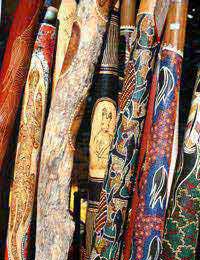Using Australian Aboriginal Records to Trace Your Family History

The Aborigines are the indigenous people of Australia, with a history that dates back for millenniums. However you might consider their treatment at the hands of Europeans, the fact is that there aren't too many records kept about them. But the Mabo decision of 1992 brought a sea change, when the High Court ruled that Australia had not been Terra Nullius, or empty land, when the Europeans first arrived in 1788. That meant the Aborigines were finally recognised as the original inhabitants of Australia. Since 1993 archives have been collating what Aboriginal records they have in their possession. From a family history point of view, many are of limited value, but digging might reveal some information.
Much of the assembly of Aboriginal records actually followed the 1997 report Bringing Them Home. This was a government inquiry into the shameful practice of forcibly separating Aboriginal and Torres Strait Islander children from their parents, after which many Australians realised how shabbily their ancestors had treated the indigenous population.
Using the Aboriginal Name Index for Your Family History Research
The Aboriginal Name Index is in the South Australia Archives, an ongoing project trying to list the names of all the individuals of Aboriginal descent who are in the South Australian Government records. The intention is to have it as a reference were people can research their Aboriginal family and community roots.As of 2006, the Index contained some 70,000 entries, the oldest dating back to 1836, covering both South Australia and the Northern Territory (which was originally a part of South Australia). It includes tribal names and nicknames, as well as a person's age, sex, and where they lived, with a description of what's recorded about them, and the State Records' reference number. If you think its important for your family history project and want to access the Index, you'll need to contact the Aboriginal Access Team
Looking West - Guide to Aboriginal Records
Looking West - A Guide to Aboriginal Records in Western Australia is a collection of records, both official and non-governmental, that relate to Aborigines living in Western Australia. The files cover mission and police records and native welfare administration - basically, anything relating to Aborigines that can be found, including court and education records.Victoria Aboriginal Records and "My Heart Is Breaking" Book
Victoria has relatively extensive records on Aborigines and the State administration of their affairs, which can be found at the Public Records Office Victoria. The most detailed records cover the period from 1839 to 1859, during which tribal affairs were run by the Chief Protector of Aborigines (and after him, the Guardian of Aborigines).For the time between 1860 and 1960, you'll find records split between the Public Records Office and the Melbourne office of the National Archives. This can create frustration for a family history researcher, but unfortunately there's no way around it. However, you can find who holds what in the book My Heart is Breaking: A joint guide to records about Aboriginal People in the Public Record Office of Victoria and Australian Archives, Victorian Regional Office.
New South Wales Aboriginal Documents
New South Wales has a number of documents relating to Aborigines in its State Records Office, and many of these are accessible online. However, they don't date back as far as might be desirable.Australian National Archives: Aboriginal Records
Most of the records in the National Archives deal with Northern Territory Aborigines, because the Commonwealth administered the Territory from 1901 until it was granted self-government in 1978. The records are in the Archives' offices in Darwin and Canberra.After 1968, a change in the Australian Constitution gave the power to legislate for Aboriginals to the Commonwealth, rather than keeping it with the states. Because of this, all Australian Aboriginal records after this time are in the National Archives.
The Archives also publish a number of fact sheets and guides, which are easily accessible, including the Bringing Them Home names index.








